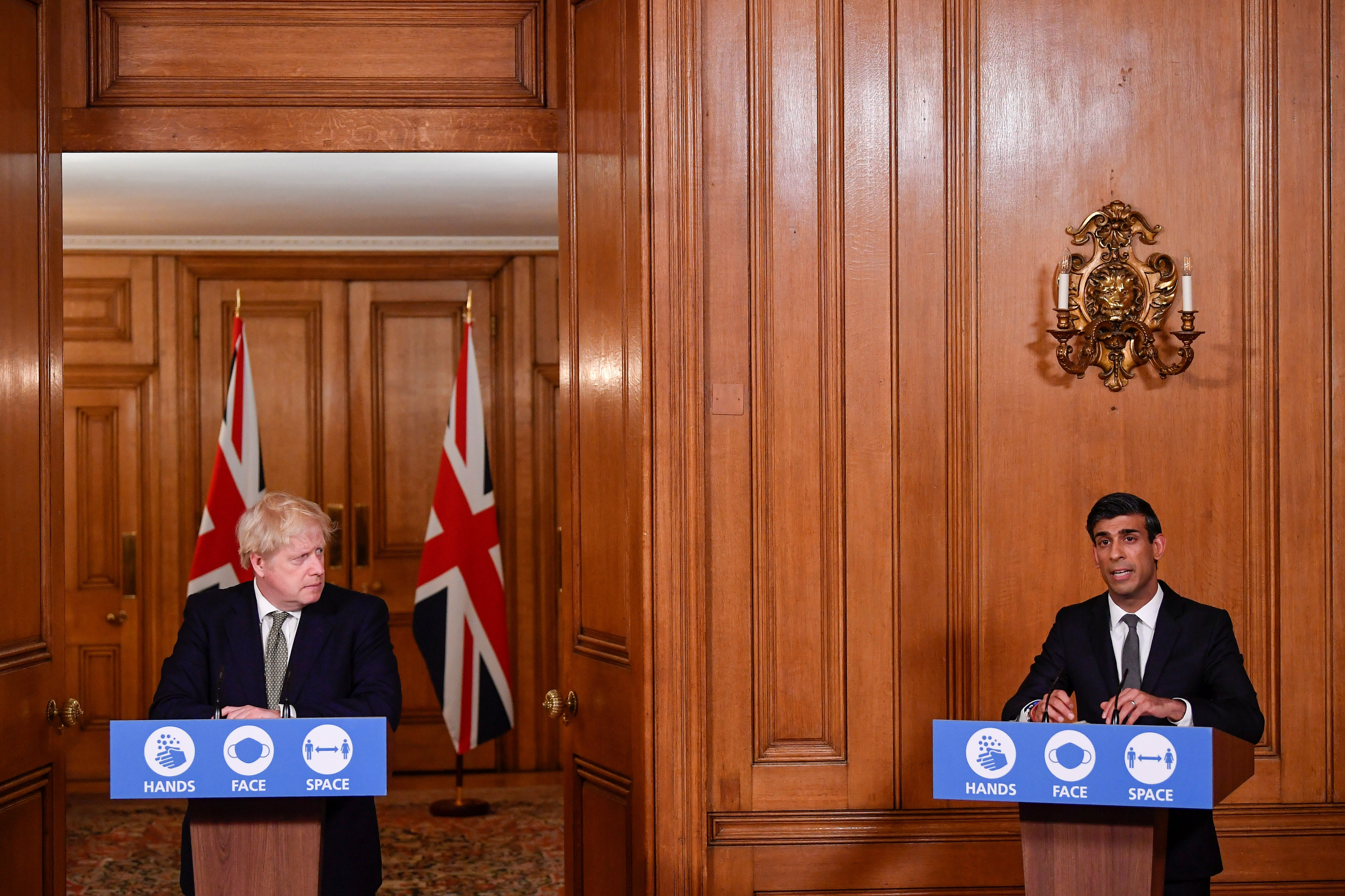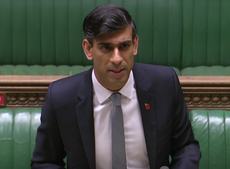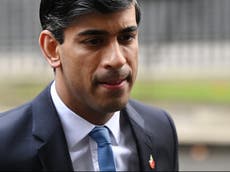Rishi Sunak setting UK up for tax rises in coming years, experts warn
‘If they are also serious about what Mr Sunak has described as the sacred duty to balance the books, there are certainly going to have to be tax rises somewhere down the line’

Your support helps us to tell the story
From reproductive rights to climate change to Big Tech, The Independent is on the ground when the story is developing. Whether it's investigating the financials of Elon Musk's pro-Trump PAC or producing our latest documentary, 'The A Word', which shines a light on the American women fighting for reproductive rights, we know how important it is to parse out the facts from the messaging.
At such a critical moment in US history, we need reporters on the ground. Your donation allows us to keep sending journalists to speak to both sides of the story.
The Independent is trusted by Americans across the entire political spectrum. And unlike many other quality news outlets, we choose not to lock Americans out of our reporting and analysis with paywalls. We believe quality journalism should be available to everyone, paid for by those who can afford it.
Your support makes all the difference.Rishi Sunak could be putting Britain on the path towards major tax rises in the years ahead as he sets out big spending plans in a review of public expenditure this week, experts have warned.
The chancellor is expected to use the one-year spending review on Wednesday to allocate funds to projects designed to drive Boris Johnson’s “levelling-up” agenda of investments in left behind parts of the country.
Among measures already unveiled, Mr Sunak will set out £100bn plan for long-term infrastructure investment and a £3bn package of new spending to support the NHS, including money to address a backlog in operations that were delayed by Covid-19.
He is also expected reaffirm the government’s existing pledges on police, nurses and schools by allocating funding to support recruitment drives and the Conservatives’ manifesto pledge of 50 million additional GP appointments.
After cancelling the Budget pencilled in for the autumn, he will not have to set out immediately how he intends to pay for any increase in departmental spending on public services, research economist Ben Zaranko of the Institute for Fiscal Studies (IFS) told The Independent.
With generous settlements already announced for the NHS, schools and the military, the big question on Wednesday will be how much money the chancellor allocates to the continued cost of Covid – including the possible extension of the £20-a-week universal credit uplift currently due to expire in April – and how much is left for other public services.
“If they are also serious about what Mr Sunak has described as ‘the sacred duty to balance the books’, there are certainly going to have to be tax rises somewhere down the line,” Mr Zaranko said.
After a decade of austerity, there is little scope for the chancellor to find money through cuts to public services beyond his expected announcement of a freeze on public sector pay, he added.
And while current interest rates mean the cost of borrowing is at a historic low, the IFS calculates that some £40bn of tightening will be needed by the next election just to stabilise debt levels following the unprecedented £200bn response to the Covid-19 crisis.
“It’s difficult to see how he could raise anything like that sort of money without looking at the big three taxes – income tax, national insurance and VAT,” said Mr Zaranko. “The Conservatives promised in their manifesto not to raise the rates of any of them, but there are stealthy ways to increase the take, for instance by freezing thresholds.
“Broad-based tax rises are likely to be required. I don’t think we can raise that sort of money just by taxing corporations or those at the top.”
A key indicator on Wednesday will be whether the Office for Budget Responsibility forecasts borrowing to be lower by the time of the next election in 2024, which will signal whether the watchdog regards the damage done by coronavirus as a permanent structural hit to the economy or merely a temporary blip.
Describing Wednesday’s event as “a budget without taxes”, Mr Zaranko said the bill for spending now could be deferred until after the next election, to save the government from having to ask voters to tighten their belts just as they are about to go to the polls.
But Mr Sunak’s strong hint on Sunday that a public sector pay freeze will be announced threatens to overshadow the spending review, as Frances O’Grady, the general secretary of the TUC, who has worked with the chancellor to deliver key coronavirus economic policies, described the move as “morally obscene”.
In a speech to Reuters on Monday, his opposite number Anneliese Dodds will say that firefighters, hospital porters and teaching assistants will be “worried about making ends meet ahead of Christmas”.
The shadow chancellor will accuse Mr Sunak of “irresponsible choices and unacceptable delays”, warning that a pay freeze for millions of public sector workers will jeopardise the economic recovery from the pandemic.
And in a new analysis, the Institute for Public Policy Research (IPPR) think tank has also urged the Treasury not to be timid and to inject £164bn into the economy over 2021-22 in order for the country to fully recover after the crisis, deliver on the UK’s legally binding target to hit net zero emissions by 2050, and restore public services to pre-austerity levels.
Citing an increase in food bank usage and the hundreds of thousands who have lost their jobs over the course of the pandemic, Carys Roberts, the executive director of the organisation warned: “This tide of hardship will only swell without adequate support for the economy.”
IPPR senior economist Carsten Jung said: “Our call for a £164bn stimulus may sound large but, in fact, it is economically the right thing to do.
“It’s about 40 per cent less than the government will have spent on the coronavirus crisis in the current fiscal year. And with interest rates at a historic low, our analysis shows it will actually result in a lower national debt, relative to the UK’s output, compared to a more cautious approach. We can’t scrimp and save our way to paying for Covid, we can only grow our way to do so.”
The director of the National Institute for Social and Economic Research (Niesr), Jagjit Chadha, said that Mr Sunak should not allow the burden of coronavirus support to divert him from the “levelling up” investment promised before the pandemic.
“The Covid crisis has further revealed gaps in capital formation – physical, human and intangible – that have become clear since the financial crisis and, even more so, since the Brexit vote,” Prof Chadha told The Independent.
“Regions with lower-skilled workers and lower levels of productivity are also the ones worst affected by Covid. The pandemic has highlighted the need to create more resilience in terms of education, physical infrastructure and bridging the digital divide, as well as areas like public health and social care.”
Despite public debt levels likely to reach 110 per cent of GDP before the pandemic recedes, Prof Chadha said Mr Sunak should not shy away from borrowing to invest in the kind of structural change which would allow the UK to bounce back strongly from coronavirus.
“The cost of borrowing is nearly zero in real terms, and we have a very long maturity structure to our debt, which is repaid over 15 years,” he said. “UK bonds are still a permanent feature in most international portfolios, so it is clear that international investors are still happy to hold sterling.”




Join our commenting forum
Join thought-provoking conversations, follow other Independent readers and see their replies
Comments